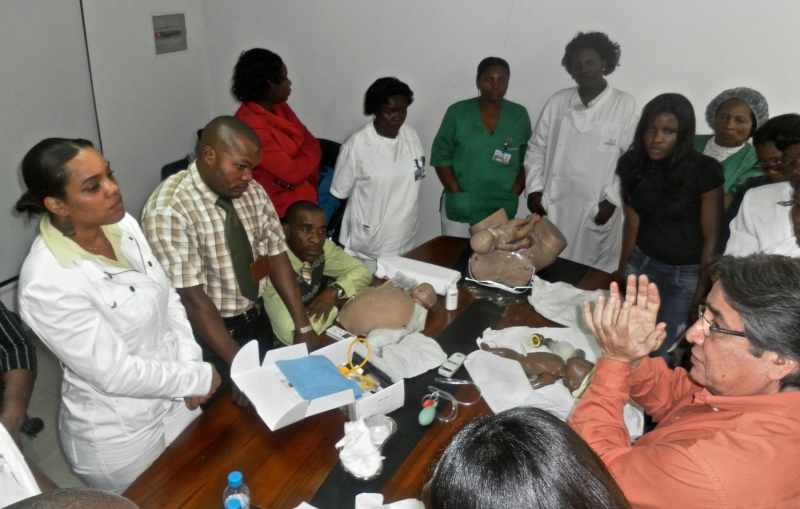-

Jhony Juarez, Jhpiego’s technical director in Angola (bottom right), leads a training in basic emergency obstetric care for health providers.
Over the past eight years, the Angolan government has been working hard to improve the health and welfare of women and their families in this western African country. In collaboration with Jhpiego and other partners, these efforts to meet the Millennium Development Goals for 2015 have produced significant results—the maternal death rate has gone down from 1,400 to 610 per 100,000. More children under five are surviving, and infant deaths have declined from 150 to 116 per 1,000.
And yet, HIV and AIDS remain a threat to families because many mothers living with HIV are not able to receive the drugs needed to prevent their newborn babies from becoming infected, or to be treated themselves. Malaria is a constant risk—an Angolan woman who contracts malaria during pregnancy is very likely to lose the baby she is carrying, even though malaria in pregnancy is preventable.
In provinces throughout Angola, women lack access to some basic health care—for example, family planning, which allows women to safely space their pregnancies and reduce the risk of injury to mother and child.
Committed to continuing the gains in health outcomes, improving access to high-quality care and saving lives, the government of Angola has embarked on a five-year partnership, with Jhpiego and Management Sciences for Health (MSH), to strengthen its health services for family planning, malaria, prevention of mother-to-child transmission (PMTCT) of HIV/AIDS and HIV counseling and testing. Funded by the U.S. Agency for International Development, the work will be concentrated in the provinces of Luanda and Huambo, where more than a third of the country’s 17 million people live.
Jhpiego’s work in Angola is part of its ongoing efforts to partner with countries in building the capacity of health care workers and strengthening health systems to prevent the needless deaths of women and families. The organization develops innovative, low-cost technologies to address today’s global health challenges and works with communities to increase frontline health workers’ ability to deliver lifesaving care.
As part of the Strengthening Angolan Systems of Health (SASH) project—known as ForçaSaúde in Portuguese—Jhpiego will work collaboratively with the Ministry of Health (MOH), the provincial and municipal governments and other partners to improve the capacity of Angolan health leaders, supervisors and providers to manage and implement services that will reduce maternal and newborn deaths. This capacity-building, or “enabling, not doing” approach, will make it possible for municipal teams in each province to develop, implement, budget and monitor their annual health plans, effectively and efficiently, to ensure that every Angolan woman and child in Luanda and Huambo will have access to quality health care.
The SASH project will build on Jhpiego’s presence in Angola. Over the past five years, with funding from the ExxonMobil Foundation, Jhpiego has succeeded in providing more than 65,000 pregnant women with prevention of malaria treatment. And in one province alone, Jhpiego helped increase the use of insecticide-treated bed nets by as much as 30 percent. As a key player in the Essential Health Services Project, Jhpiego focused on reducing HIV transmission from mother to child. Since 2006, 82 sites offering integrated PMTCT services and 107 sites offering voluntary counseling and testing services have been established or strengthened. By 2011, more than 169,154 pregnant women and 286,332 men and non-pregnant women were tested and knew their HIV status. The project also coordinated with local nongovernmental organizations and associations to follow up seropositive pregnant women and exposed children to ensure their adherence to prophylaxis and treatment. The national rate of adherence for 2010 was 37 percent. In the health centers where the program was implemented, adherence rose to 92 percent and institutional deliveries to 87 percent.
“I believe that the Angolan government’s and the MOH’s focus on decentralization at the municipal level and integration of services will provide the right framework for ForçaSaúde to continue supporting the health sector effectively, and further contribute to the improvement of the Angolan population health status,” said Edgar Necochea, Director of Health and Organizational Performance at Jhpiego.
The new SASH project now affords Jhpiego the opportunity to share with Angolans its global health management experience in building the skills of health care managers and workers, integrating services for women and families, and developing a sustainable model of success in preventing the needless deaths of mothers and children.
This article was originally published January 25, 2012.



